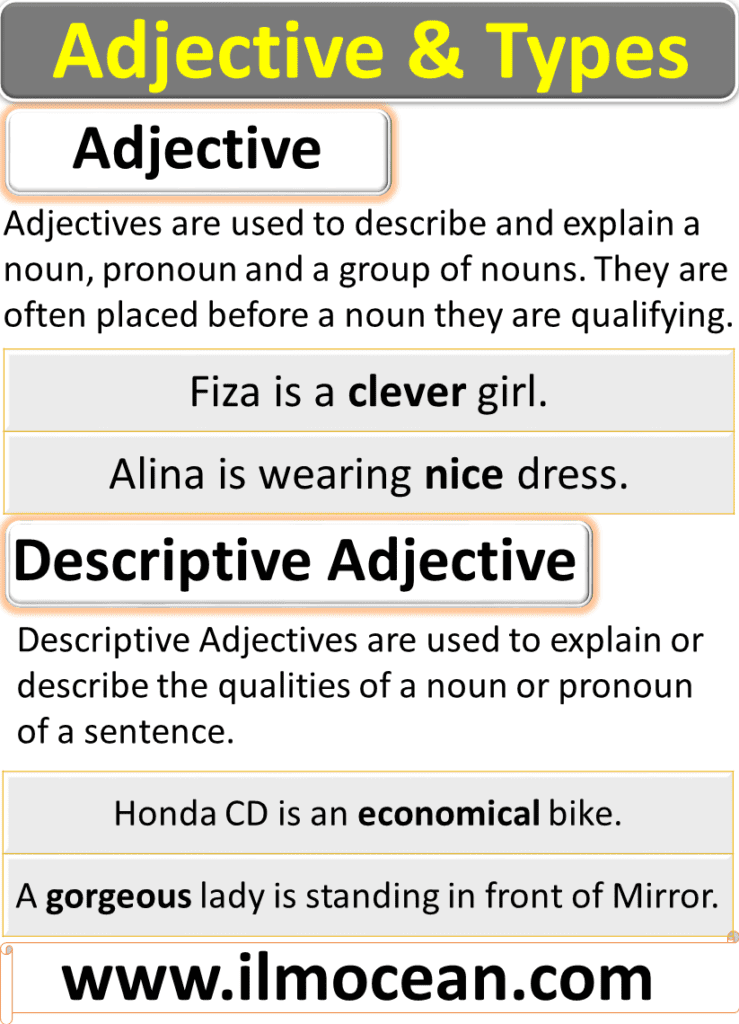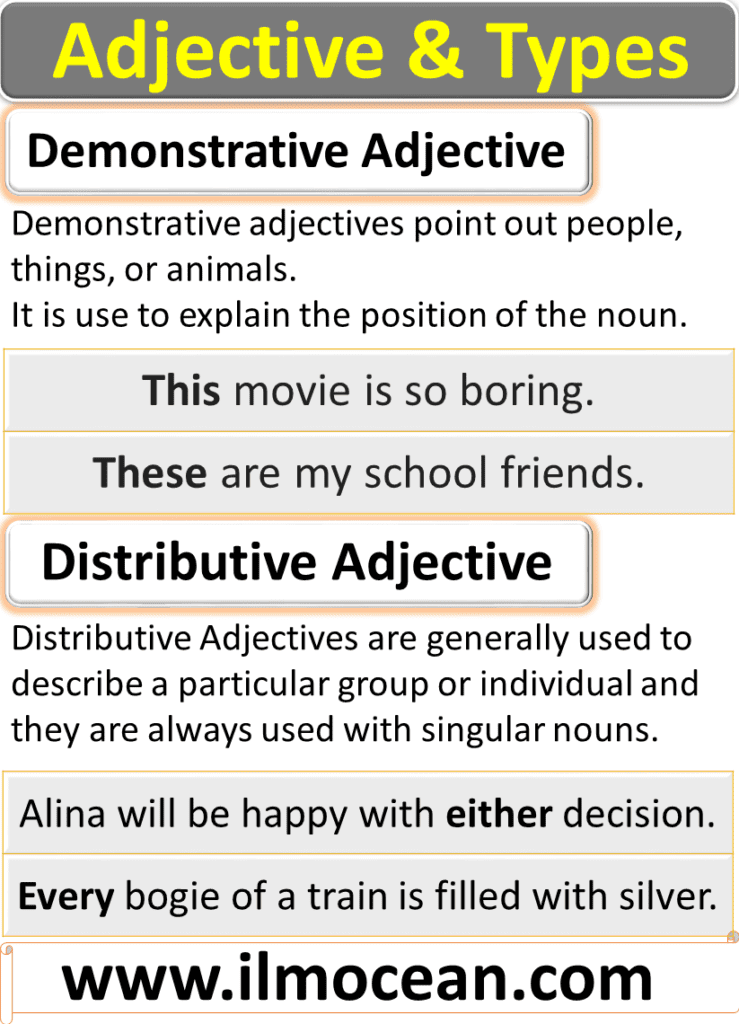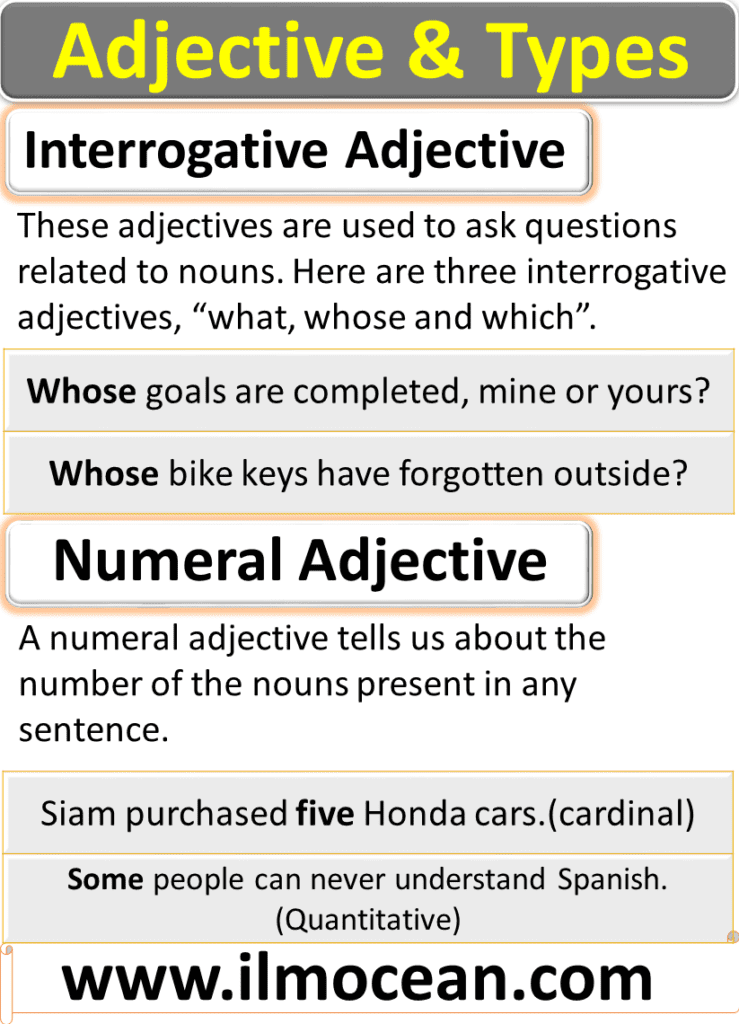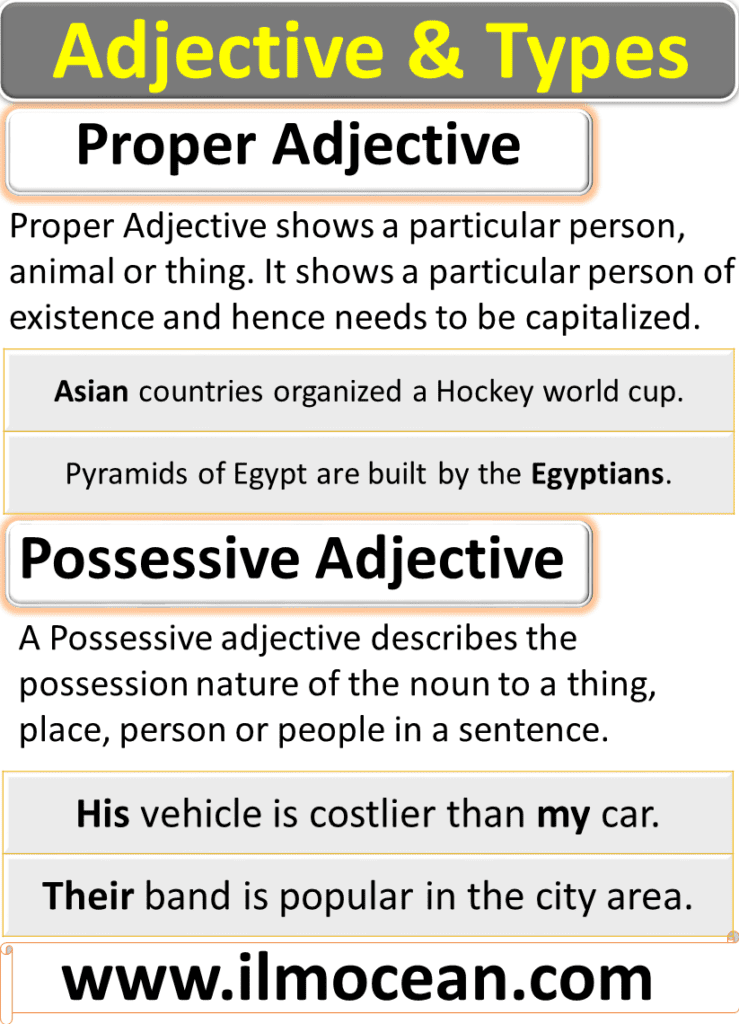Adjective has a vital role in English grammar, because an adjective describes the characteristics of a noun or noun phrase or pronoun. Its major role is to change or modify the information given by the noun. They are usually placed before the nouns they modify. In a simple way, Adjectives are the words that shows the qualities or states of being of nouns. So we can say, an adjective is a word used with a noun to add something to its meaning. In English grammar, adjectives
have been considered as a part of speech in various types and to learn each type of adjective in detail you must read the article further.
Adjective:
Adjectives are used to describe and explain a noun, pronoun and a group of nouns. They are often placed before a noun they are qualifying. Look the examples of adjectives given below.
- Fiza is a clever
- Anthony is naughty boy in the class.
- The color of my house is
- Alina is wearing nice
- Descriptive Adjective:
Descriptive Adjectives are used to explain or describe the qualities of a noun or pronoun of a sentence.
Examples:
- Honda CD is an economical
- The Alam Chana was a tall man in the world.
- Bahrain University has an attractive infrastructure
- A gorgeous lady is standing in front of Mirror.
- Siam came into the party with an ugly hair style.

- Demonstrative Adjective:
Demonstrative adjectives point out people, things, or animals.
It is use to explain the position of the noun. In phrases or sentences, it comes before other adjectives.
- Those, this, these, that, are demonstrative adjectives.
Examples:
- This movie is so boring.
- Those are Harry’s bikes and car collections.
- These are my school friends.
- Collect all the apples and put on that
- These patties are very delicious.
- Distributive Adjective:
These are generally used to describe a particular group or individual and they are always used with singular nouns. It is used to characterize nouns.
“Each, either, neither and every,” are four distributive Adjectives.
Examples:
- Each student has to take part in sports gala.
- There were two sewing machines, but neither worked properly.
- Alina will be happy with either
- Every bogie of a train is filled with silver.
- The monkey divided the piece of and gave them to each

- Interrogative Adjective:
Interrogative adjectives are used to ask questions related to nouns and modify them.
Here are three interrogative adjectives in grammar, “what, whose and which,” respectively.
Examples:
- What is the exact location of your residence in France?
- Which of these sunglasses do you want to purchase?
- Whose goals are completed, mine or yours?
- Whose bike keys have forgotten outside?
- Numeral Adjective:
It tells us about the number of the nouns present in any sentence.
There are three types of numeral Adjectives:
- Indefinite Numeral Adjectives.
- Distributive Numeral Adjectives.
- Definite Numeral Adjectives.(cardinal and ordinal)
Examples:
- Siam purchased five Honda cars from the showroom. (Cardinal)
- The second part of this movie is boring. (Ordinal)
- Some people can never understand Spanish. (Quantitative)
- All the money you have can never buy joy. (Indefinite)
- Every living thing needs clean atmosphere.

- Quantitative Adjective:
Thia type is used to describe the noun (person or thing) and its quantity in the sentence. Sometimes we take a numeral adjective as a quantitative adjective though it specifies the numbers.
- Little, tall, much, more, few, large, all, small, thirty, fifty, etc.
Examples:
- Andrew played the guitar for the very first
- Ahmad scored 98marks in a recent test.
- Clark’s office cabin is shifted to the third
- Among all, some ofthem are French, a few are Italian, and the rest are Asians.
- Two boys are badly injured in a road accident.
- Proper Adjective:
This type describe an appropriate person, object, animal or thing.
It shows a particular person of existence and hence needs to be capitalized.
Examples:
- Asian countries organized a Hockey world cup.
- The Indian Oceanis one of the largest ocean on Earth.
- I tasted a variety of food, but Lahorifood has the best taste.
- Pyramids of Egypt are built by the Egyptians.
- The most dominant currency in the world is the dollar.
- Possessive Adjective:
This type describes the possession nature of the noun to a thing, place, person or people in a sentence. It also acts as a possessive pronoun.
- First-person: our, my.
- Second-person: yours.
- Third-person: her, his, their, whose, its.
Examples:
- My mobile is working better now as it has worked in the beginning.
- His vehicle is costlier than my
- I saw your father near the grocery market.
- Their band is popular in the city area.
- Both twin sisters have their cupboard for clothes.


